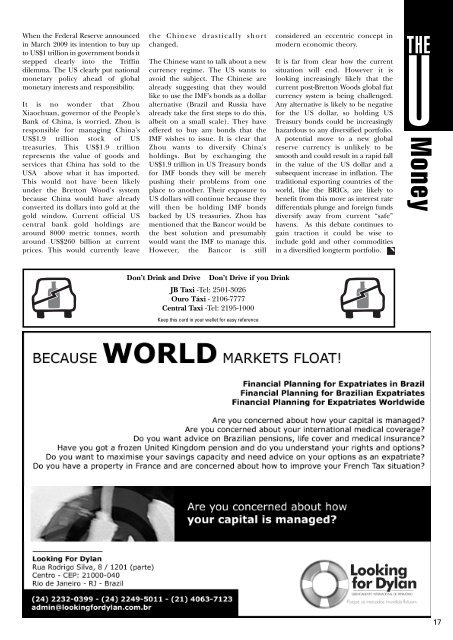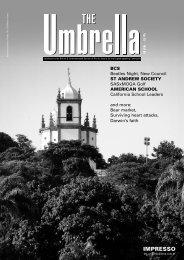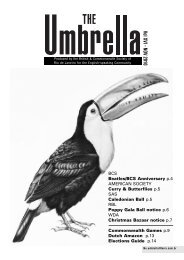Create successful ePaper yourself
Turn your PDF publications into a flip-book with our unique Google optimized e-Paper software.
When the Federal Reserve announced<br />
in March 2009 its intention to buy up<br />
to US$1 trillion in government bonds it<br />
stepped clearly into the Triffin<br />
dilemma. The US clearly put national<br />
monetary policy ahead of global<br />
monetary interests and responsibility.<br />
It is no wonder that Zhou<br />
Xiaochuan, governor of the People's<br />
Bank of China, is worried. Zhou is<br />
responsible for managing China's<br />
US$1.9 trillion stock of US<br />
treasuries. This US$1.9 trillion<br />
represents the value of goods and<br />
services that China has sold to the<br />
USA above what it has imported.<br />
This would not have been likely<br />
under the Bretton Wood's system<br />
because China would have already<br />
converted its dollars into gold at the<br />
gold window. Current official US<br />
central bank gold holdings are<br />
around 8000 metric tonnes, worth<br />
around US$260 billion at current<br />
prices. This would currently leave<br />
the Chinese drastically short<br />
changed.<br />
The Chinese want to talk about a new<br />
currency regime. The US wants to<br />
avoid the subject. The Chinese are<br />
already suggesting that they would<br />
like to use the IMF's bonds as a dollar<br />
alternative (Brazil and Russia have<br />
already take the first steps to do this,<br />
albeit on a small scale). They have<br />
offered to buy any bonds that the<br />
IMF wishes to issue. It is clear that<br />
Zhou wants to diversify China's<br />
holdings. But by exchanging the<br />
US$1.9 trillion in US Treasury bonds<br />
for IMF bonds they will be merely<br />
pushing their problems from one<br />
place to another. Their exposure to<br />
US dollars will continue because they<br />
will then be holding IMF bonds<br />
backed by US treasuries. Zhou has<br />
mentioned that the Bancor would be<br />
the best solution and presumably<br />
would want the IMF to manage this.<br />
However, the Bancor is still<br />
considered an eccentric concept in<br />
modern economic theory.<br />
It is far from clear how the current<br />
situation will end. However it is<br />
looking increasingly likely that the<br />
current post-Bretton Woods global fiat<br />
currency system is being challenged.<br />
Any alternative is likely to be negative<br />
for the US dollar, so holding US<br />
Treasury bonds could be increasingly<br />
hazardous to any diversified portfolio.<br />
A potential move to a new global<br />
reserve currency is unlikely to be<br />
smooth and could result in a rapid fall<br />
in the value of the US dollar and a<br />
subsequent increase in inflation. The<br />
traditional exporting countries of the<br />
world, like the BRICs, are likely to<br />
benefit from this move as interest rate<br />
differentials plunge and foreign funds<br />
diversify away from current “safe”<br />
havens. As this debate continues to<br />
gain traction it could be wise to<br />
include gold and other commodities<br />
in a diversified longterm portfolio.<br />
Money<br />
Don’t Drink and Drive Don’t Drive if you Drink<br />
JB Taxi -Tel: 2501-3026<br />
Ouro Táxi - 2106-7777<br />
Central Taxi -Tel: 2195-1000<br />
Keep this card in your wallet for easy reference<br />
17






